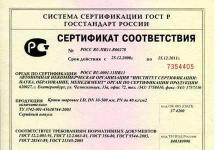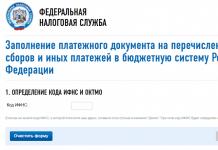Full text of Art. 112 of the Labor Code of the Russian Federation with comments. New current edition with additions for 2019. Legal advice on Article 112 of the Labor Code of the Russian Federation.
Non-working holidays in the Russian Federation are:
January 1, 2, 3, 4, 5, 6 and 8 - New Year holidays;
January 7 - Christmas;
February 23 - Defender of the Fatherland Day;
March 8 - International Women's Day;
May 1 - Spring and Labor Day;
May 9 - Victory Day;
June 12 - Russia Day;
November 4 is National Unity Day.
If a day off coincides with a non-working holiday, the day off is transferred to the next working day after the holiday, with the exception of weekends coinciding with non-working holidays specified in paragraphs two and three of part one of this article. The Government of the Russian Federation transfers two days off from the number of days off that coincide with non-working holidays specified in paragraphs two and three of part one of this article to other days in the next calendar year in the manner established by part five of this article.
Employees, with the exception of employees receiving a salary (official salary), are paid additional remuneration for non-working holidays on which they were not involved in work. The amount and procedure for payment of the specified remuneration are determined by the collective agreement, agreements, local regulations adopted taking into account the opinion of the elected body of the primary trade union organization, and an employment contract. Amounts of expenses for the payment of additional remuneration for non-working holidays are included in the full amount of labor costs.
Parts three and four of the previous edition from January 1, 2005 are considered respectively parts four and five of this edition - Federal Law of December 29, 2004 N 201-FZ
The presence of non-working holidays in a calendar month is not a basis for reducing wages for employees receiving a salary (official salary).
For the purpose of rational use by employees of weekends and non-working holidays, weekends may be transferred to other days by federal law or a regulatory legal act of the Government of the Russian Federation. In this case, the regulatory legal act of the Government of the Russian Federation on the transfer of days off to other days in the next calendar year is subject to official publication no later than a month before the start of the corresponding calendar year. The adoption of regulatory legal acts of the Government of the Russian Federation on the transfer of days off to other days during the calendar year is permitted subject to the official publication of these acts no later than two months before the calendar date of the established day off.
Commentary on Article 112 of the Labor Code of the Russian Federation
The commented article contains a list of non-working holidays in the Russian Federation, and also defines the rules for transferring a day off if it coincides with a non-working holiday.
If a day off coincides with a non-working holiday, the day off is transferred to the next working day after the holiday (Part 2 of Article 112 of the Labor Code of the Russian Federation).
For New Year's holidays, different transfer rules have been adopted. Since 2013, two days off (January 5 and 6), coinciding with the New Year holidays or Christmas, can be moved by the Government of the Russian Federation to any other days in the same year (Part 2 of Article 112 of the Labor Code of the Russian Federation).
The rules for transferring holidays do not apply to employers whose work suspension on non-working holidays is impossible due to production and organizational conditions (clause 2 of the Procedure for calculating working time standards for certain calendar periods of time (month, quarter, year) depending on the established duration working hours per week, approved by order of the Ministry of Health and Social Development of Russia dated August 13, 2009 N 588n).
For the purpose of rational use by employees of weekends and non-working holidays, weekends may be transferred by the Government of the Russian Federation to other days in the same year (Part 5 of Article 112 of the Labor Code of the Russian Federation).
The resolution of the Government of the Russian Federation on the postponement of weekends and non-working holidays must be published (Part 5 of Article 112 of the Labor Code of the Russian Federation):
- no later than one month before the start of the corresponding calendar year;
- no later than 2 months before the calendar date of the established day off.
In the Recommendations of the Federal Service for Labor and Employment on compliance with labor laws governing the procedure for granting employees non-working holidays (approved at a meeting of the working group on informing and consulting workers and employers on compliance with labor laws and regulations containing labor laws, Protocol No. 1, dated June 2, 2014), it is noted that the transfer of weekends when they coincide with holidays is possible only if the following conditions are met:
- adoption of the relevant federal law or regulatory legal act of the Government of the Russian Federation;
- compliance with the deadlines for the official publication of the regulatory legal act of the Government of the Russian Federation on the transfer of days off.
So, for example, Decree of the Government of the Russian Federation dated August 27, 2014 N 860 “On the postponement of weekends in 2015” established that in order to rationally use weekends and non-working holidays by employees, the following weekends are postponed in 2015:
- from Saturday January 3 to Friday January 9;
- from Sunday 4 January to Monday 4 May.
It follows from the above that other persons, in particular employers, do not have the right to independently transfer days off if they coincide with holidays. The rule of postponing a day off when it coincides with a holiday to the next working day also applies to regional holidays, since the legislator does not establish specific features for them and does not provide for the possibility of introducing a different procedure. At the same time, it is necessary to keep in mind that it is a weekend day that is postponed, and not a holiday, since the latter, as a rule, is tied to a specific date, unlike a weekend day. But even if the holiday was initially set not on any date, but on a day of the week that is a day off, then the transfer of this day off is made on a general basis, i.e. on the first working day following it.
The presence of non-working holidays in a month is not a basis for reducing wages for employees receiving a salary (Part 4 of Article 112 of the Labor Code of the Russian Federation).
At the same time, employees who are on other remuneration systems are also entitled to additional remuneration for non-working holidays on which they were involved in work, the amount and procedure for payment of which are determined in the collective agreement, agreement, LNA, employment contract (Part 3 of Art. 112 of the Labor Code of the Russian Federation).
Non-working holidays falling during the period of annual paid leave are not included in the number of calendar days of leave ().
It should also be noted that in accordance with Part 7 of Art. 4 of the Federal Law of September 26, 1997 N 125-FZ “On Freedom of Conscience and Religious Associations”, at the request of religious organizations, the relevant government bodies in the Russian Federation have the right to declare religious holidays non-working (holiday) days in the relevant territories. In this connection, in the above-mentioned Recommendations of the Federal Service for Labor and Employment on compliance with labor legislation regulating the procedure for providing employees with non-working holidays, it is noted that in certain territories of Russia (in particular, in the constituent entities of the Russian Federation) their own non-working holidays may be introduced days subject to the following conditions:
- religious orientation of the holiday;
- receipt of a request from a religious organization;
- decision-making by the relevant government authority.
Another comment to Art. 112 Labor Code of the Russian Federation
1. Part 1 of the commented article establishes all-Russian non-working holidays. Taking into account the division of powers between federal government bodies and government bodies of constituent entities of the Russian Federation in the field of labor relations and other directly related relations, constituent entities of the Russian Federation have the right to establish additional non-working holidays, in addition to those established in Part 1 of the commented article. This is of particular importance in a multinational and multi-religious state, such as the Russian Federation. Replacing certain non-working holidays provided for by federal law with other days would be contrary to the Labor Code (see Article 6 of the Labor Code and the commentary thereto).
2. In accordance with parts 3 and 4 of the commented article, non-working holidays are subject to payment. For employees whose remuneration system provides for monthly payment of salary (official salary), if there are non-working holidays in a calendar month, the amount of wages for that month is not reduced. Under other remuneration systems, for non-working holidays on which employees were not involved in work, they are paid additional remuneration. The procedure for establishing the amount of remuneration is specified in Part 4 of the commented article.
Consultations and comments from lawyers on Article 112 of the Labor Code of the Russian Federation
If you still have questions regarding Article 112 of the Labor Code of the Russian Federation and you want to be sure of the relevance of the information provided, you can consult the lawyers of our website.
You can ask a question by phone or on the website. Initial consultations are held free of charge from 9:00 to 21:00 daily Moscow time. Questions received between 21:00 and 9:00 will be processed the next day.
Files for download:
Labor Code of the Russian Federation
Part three
Section V. Rest time
Article 108. Breaks for rest and food
During the working day (shift), the employee must be given a break for rest and food lasting no more than two hours and no less than 30 minutes, which is not included in working hours. Internal labor regulations or an employment contract may stipulate that the specified break may not be provided to an employee if the duration of daily work (shift) established for him does not exceed four hours.
(as amended by Federal Law dated June 18, 2017 N 125-FZ)
The time for granting a break and its specific duration are established by internal labor regulations or by agreement between the employee and the employer.
At jobs where, due to production (work) conditions, it is impossible to provide a break for rest and food, the employer is obliged to provide the employee with the opportunity to rest and eat food during working hours. The list of such work, as well as places for rest and eating, are established by the internal labor regulations.
(as amended by Federal Law No. 90-FZ of June 30, 2006)
Article 109. Special breaks for heating and rest
For certain types of work, it is envisaged that employees will be provided with special breaks during working hours, determined by the technology and organization of production and labor. The types of these works, the duration and procedure for providing such breaks are established by the internal labor regulations.
(as amended by Federal Law No. 90-FZ of June 30, 2006)
Employees working in the cold season in the open air or in closed, unheated rooms, as well as loaders engaged in loading and unloading operations, and other workers, if necessary, are provided with special breaks for heating and rest, which are included in working hours. The employer is obliged to provide premises for heating and rest of employees.
Article 110. Duration of weekly uninterrupted rest
The duration of weekly uninterrupted rest cannot be less than 42 hours.
Article 111. Weekends
All employees are provided with days off (weekly continuous rest). With a five-day work week, employees are given two days off per week, and with a six-day work week - one day off.
The general day off is Sunday. The second day off in a five-day work week is established by a collective agreement or internal labor regulations. Both days off are usually provided in a row.
(as amended by Federal Law No. 90-FZ of June 30, 2006)
For employers whose work suspension on weekends is impossible due to production, technical and organizational conditions, days off are provided on different days of the week in turn to each group of employees in accordance with the internal labor regulations.
(as amended by Federal Law No. 90-FZ of June 30, 2006)
Article 112. Non-working holidays
Non-working holidays in the Russian Federation are:
(as amended by Federal Law No. 35-FZ dated April 23, 2012)
November 4 is National Unity Day.
(Part one as amended by Federal Law dated December 29, 2004 N 201-FZ)
If a day off coincides with a non-working holiday, the day off is transferred to the next working day after the holiday, with the exception of weekends coinciding with non-working holidays specified in paragraphs two and three of part one of this article. The Government of the Russian Federation transfers two days off from the number of days off that coincide with non-working holidays specified in paragraphs two and three of part one of this article to other days in the next calendar year in the manner established by part five of this article.
(as amended by Federal Law No. 35-FZ dated April 23, 2012)
Employees, with the exception of employees receiving a salary (official salary), are paid additional remuneration for non-working holidays on which they were not involved in work. The amount and procedure for payment of the specified remuneration are determined by the collective agreement, agreements, local regulations adopted taking into account the opinion of the elected body of the primary trade union organization, and an employment contract. Amounts of expenses for the payment of additional remuneration for non-working holidays are included in the full amount of labor costs.
(Part three as amended by Federal Law No. 90-FZ of June 30, 2006)
The presence of non-working holidays in a calendar month is not grounds for reducing wages for employees receiving a salary (official salary).
(Part four as amended by Federal Law No. 90-FZ of June 30, 2006)
For the purpose of rational use by employees of weekends and non-working holidays, weekends may be transferred to other days by federal law or a regulatory legal act of the Government of the Russian Federation. In this case, the regulatory legal act of the Government of the Russian Federation on the transfer of days off to other days in the next calendar year is subject to official publication no later than a month before the start of the corresponding calendar year. The adoption of regulatory legal acts of the Government of the Russian Federation on the transfer of days off to other days during the calendar year is permitted subject to the official publication of these acts no later than two months before the calendar date of the established day off.
(as amended by Federal Laws dated June 30, 2006 N 90-FZ, dated April 23, 2012 N 35-FZ)
Article 113. Prohibition of work on weekends and non-working holidays. Exceptional cases of attracting employees to work on weekends and non-working holidays
(as amended by Federal Law No. 90-FZ of June 30, 2006)
Work on weekends and non-working holidays is prohibited, except as provided for by this Code.
Involvement of employees to work on weekends and non-working holidays is carried out with their written consent if it is necessary to perform unforeseen work, the urgent implementation of which subsequently determines the normal work of the organization as a whole or its individual structural divisions, or an individual entrepreneur.
Involving employees to work on weekends and non-working holidays without their consent is permitted in the following cases:
1) to prevent a catastrophe, industrial accident or eliminate the consequences of a catastrophe, industrial accident or natural disaster;
2) to prevent accidents, destruction or damage to the employer’s property, state or municipal property;
3) to perform work the need for which is due to the introduction of a state of emergency or martial law, as well as urgent work in emergency circumstances, that is, in the event of a disaster or threat of disaster (fires, floods, famine, earthquakes, epidemics or epizootics) and in other cases, threatening the life or normal living conditions of the entire population or part of it.
Involvement in work on weekends and non-working holidays of creative workers of the media, cinematography organizations, television and video crews, theaters, theatrical and concert organizations, circuses and other persons involved in the creation and (or) performance (exhibition) of works, in in accordance with the lists of jobs, professions, positions of these workers, approved by the Government of the Russian Federation, taking into account the opinion of the Russian Tripartite Commission for the Regulation of Social and Labor Relations, is permitted in the manner established by the collective agreement, local regulations, or employment contract.
(as amended by Federal Law No. 13-FZ dated February 28, 2008)
In other cases, involvement in work on weekends and non-working holidays is permitted with the written consent of the employee and taking into account the opinion of the elected body of the primary trade union organization.
On non-working holidays, it is allowed to carry out work, the suspension of which is impossible due to production and technical conditions (continuously operating organizations), work caused by the need to serve the population, as well as urgent repair and loading and unloading work.
Involvement of disabled people and women with children under three years of age to work on weekends and non-working holidays is permitted only if this is not prohibited for them due to health reasons in accordance with a medical report issued in the manner established by federal laws and other regulations legal acts of the Russian Federation. At the same time, disabled people and women with children under three years of age must be informed, against signature, of their right to refuse to work on a day off or a non-working holiday.
Employees are recruited to work on weekends and non-working holidays by written order of the employer.
Labor Code of the Russian Federation
- Labor Code of the Russian Federation - table of contents
- Chapter 1. Basic principles of labor legislation
- Chapter 2. Labor relations, parties to labor relations, grounds for the emergence of labor relations
- Chapter 3. General provisions
- Chapter 4. Representatives of workers and employers in social partnership
- Chapter 5. Social partnership bodies
- Chapter 6. Collective Bargaining
- Chapter 7. Collective agreements and agreements
- Chapter 8. Participation of employees in the management of the organization
- Chapter 9. Responsibility of the parties to the social partnership
- Chapter 10. General provisions. Employment contract
- Chapter 11. Conclusion of an employment contract
- Chapter 12. Changing the employment contract
- Chapter 13. Termination of an employment contract
- Chapter 14. Protection of employee personal data
- Chapter 15. General provisions. Work time
- Chapter 16. Working hours
- Chapter 17. General provisions. Time relax
- Chapter 18. Work breaks. Weekends and non-working holidays
- Chapter 19. Vacations. Annual paid holidays
- Chapter 20. General provisions. Payment and labor standards
- Chapter 21. Wages. Payment and labor standards
- Chapter 22. Labor rationing. Payment and labor standards
- Chapter 23. General provisions. Guarantees and compensation
- Chapter 24. Guarantees when sending employees on business trips, other business trips and moving to work in another area
- Chapter 25. Guarantees and compensation to employees when they perform state or public duties
- Chapter 26. Guarantees and compensation for employees combining work with education
- Chapter 27. Guarantees and compensation to employees related to termination of an employment contract
- Chapter 28. Other guarantees and compensation
- Chapter 29. General provisions. Work schedule. Labor discipline
- Chapter 30. Labor discipline. Work schedule
- Chapter 31. General provisions. Training and additional professional education of workers
- Chapter 32. Student agreement
- Chapter 33. General provisions. Occupational Safety and Health
- Chapter 34. Occupational safety requirements
- Chapter 35. Organization of labor protection
- Chapter 36. Ensuring the rights of workers to labor protection
- Chapter 37. General provisions. Material liability of the parties to the employment contract
Return back to
ST 112 Labor Code of the Russian Federation:
Non-working holidays in the Russian Federation are:
- 1, 2, 3, 4, 5, 6 And January 8- New Year holidays;
- Jan. 7- Nativity;
- February 23- Defender of the Fatherland Day;
- March 8- International Women's Day;
- 1st of May- Labour Day;
- 9th May- Victory Day;
- 12 June- Russia Day;
- November 4- Day of National Unity.
If a day off coincides with a non-working holiday, the day off is transferred to the next working day after the holiday, with the exception of weekends coinciding with non-working holidays specified in paragraphs two and three of part one of this article. The Government of the Russian Federation transfers two days off from the number of days off that coincide with non-working holidays specified in paragraphs two and three of part one of this article to other days in the next calendar year in the manner established by part five of this article.
Employees, with the exception of employees receiving a salary (official salary), are paid additional remuneration for non-working holidays on which they were not involved in work. The amount and procedure for payment of the specified remuneration are determined by agreements, local regulations adopted taking into account the opinion of the elected body of the primary trade union organization,. Amounts of expenses for the payment of additional remuneration for non-working holidays are included in the full amount of labor costs.
The presence of non-working holidays in a calendar month is not grounds for a reduction for employees receiving a salary (official salary).
For the purpose of rational use by employees of weekends and non-working holidays, weekends may be transferred to other days by federal law or a regulatory legal act of the Government of the Russian Federation. In this case, the regulatory legal act of the Government of the Russian Federation on the transfer of days off to other days in the next calendar year is subject to official publication no later than a month before the start of the corresponding calendar year. The adoption of regulatory legal acts of the Government of the Russian Federation on the transfer of days off to other days during the calendar year is permitted subject to the official publication of these acts no later than two months before the calendar date of the established day off.
Commentary on Article 112 of the Labor Code of the Russian Federation:
The commented article establishes a list of non-working holidays that applies to the entire territory of the Russian Federation.
Subjects of the Russian Federation may establish other non-working holidays on their territory, taking into account the national and cultural characteristics of the region. One of these holidays is January 7 - Christmas. Its establishment as a holiday throughout the country may be perceived by some as an infringement of the religious feelings of believers of other faiths, therefore the republics that are part of the Russian Federation may declare religious holidays of other faiths a non-working day. This is fully consistent with Art. 28 of the Constitution of the Russian Federation, which guarantees every citizen freedom of religion.
In addition to generally established non-working holidays, there are professional holidays (Metallurgist's Day, Teacher's Day, Builder's Day, etc.), which are timed to coincide with weekends according to the calendar. If such holidays fall on working days, then release from work in practice is carried out on the basis of a collective agreement or an order (instruction) of the enterprise administration.
If a day off coincides with a non-working holiday, the day off is transferred to the next working day after the holiday. On non-working holidays, work is allowed, the suspension of which is impossible due to production and technical conditions (continuously operating organizations or work due to the need to serve the population, as well as in connection with urgent repair and loading and unloading work).
For the purpose of rational use by employees of weekends and non-working holidays, the Government of the Russian Federation has the right to transfer weekends to other days.
In cases where a day off is transferred to a working day, the duration of work on this day must correspond to the duration of the working day to which the day off is transferred (see the Procedure for calculating the norm for certain calendar periods (month, quarter, year) depending on the established duration working hours per week, approved by Order of the Ministry of Health and Social Development of Russia N 588n<1>).
Part 3 of the commented article corresponds to the International Covenant on Economic, Social and Cultural Rights<1>, by which states parties to the Covenant recognize the right of everyone to just favorable conditions of work. These conditions include rest, leisure, reasonable limitations on working hours and periodic paid leave, as well as remuneration for work on public holidays (Article 7(d) of the Covenant). Remuneration for work on public holidays is also provided for in the European Social Charter (revised), adopted in Strasbourg. According to the Charter, states that are members of the Council of Europe and signatories to the Charter, in order to ensure the effective implementation of the right to fair working conditions, undertake to establish paid public holidays (p. 2 Article 2 Part II of the Charter).
Part 4 of the commented article establishes a rule that provides that non-working holidays should not affect the wages of an employee receiving a salary (official salary). Unfortunately, this norm, which is a guarantee for this category of workers, does not include similar guarantees for workers whose work is paid in other forms. It seems that in relation to workers who do not receive payment in the form of a salary, these issues should be regulated by a collective agreement or by direct agreement between the employee and the employer.
Non-working holidays in the Russian Federation are: January 1, 2, 3, 4, 5, 6 and 8 - New Year holidays; January 7 - Christmas; February 23 - Defender of the Fatherland Day; March 8 - International Women's Day; May 1 - Spring and Labor Day; May 9 - Victory Day; June 12 - Russia Day; November 4 is National Unity Day. If a day off coincides with a non-working holiday, the day off is transferred to the next working day after the holiday, with the exception of weekends coinciding with non-working holidays specified in paragraphs two and three of part one of this article. The Government of the Russian Federation transfers two days off from the number of days off that coincide with non-working holidays specified in paragraphs two and three of part one of this article to other days in the next calendar year in the manner established by part five of this article. Employees, with the exception of employees receiving a salary (official salary), are paid additional remuneration for non-working holidays on which they were not involved in work. The amount and procedure for payment of the specified remuneration are determined by the collective agreement, agreements, local regulations adopted taking into account the opinion of the elected body of the primary trade union organization, and an employment contract. Amounts of expenses for the payment of additional remuneration for non-working holidays are included in the full amount of labor costs. The presence of non-working holidays in a calendar month is not grounds for reducing wages for employees receiving a salary (official salary). For the purpose of rational use by employees of weekends and non-working holidays, weekends may be transferred to other days by federal law or a regulatory legal act of the Government of the Russian Federation. In this case, the regulatory legal act of the Government of the Russian Federation on the transfer of days off to other days in the next calendar year is subject to official publication no later than a month before the start of the corresponding calendar year. The adoption of regulatory legal acts of the Government of the Russian Federation on the transfer of days off to other days during the calendar year is permitted subject to the official publication of these acts no later than two months before the calendar date of the established day off.
Legal advice under Art. 112 Labor Code of the Russian Federation
Question answered over the phone
Question answered over the phone
Question answered over the phone
- Lawyer's answer:
Will this day be postponed as a holiday if it falls on a weekend?)) What if the birthday falls on a national holiday? Probably in the State Duma and in the Labor Code there are no more serious problems that such nonsense is being proposed. How can you, with your employees, and even in Russia, not celebrate your birthday with at least a cake? So today they celebrate for one day, then later they will celebrate for two days. In general, the Labor Code is already full of gaps and collisions, they will add one more and 333 questions will appear for it, only there will be no clarifications and again each personnel officer will interpret everything in his own way!
You are right, and let the girl read the Labor Code carefully. Article 112. Non-working holidays. "Non-working holidays in the Russian Federation are: January 1, 2, 3, 4, 5, 6 and 8 - New Year holidays; January 7 - Christmas...
- Lawyer's answer:
It’s strange, usually in government institutions everything is paid clearly. Holidays must be paid double, according to Article 112 of the Labor Code of the Russian Federation, non-working holidays are: 1,2,3,4,5,6, January 8 - New Year's holidays, January 7 - Christmas. Go to the accounting department and figure it out, show them this article from the Labor Code. If you worked these days, you are required to pay double for everything.
- Lawyer's answer:
Art. 120 of the Labor Code states that: the duration of the annual main and additional paid leaves of employees is calculated in calendar days and is not limited to a maximum limit. Non-working holidays falling during the period of annual main or annual additional paid leave will not be included in the number of calendar days of leave. According to Article 112 of the Labor Code of the Russian Federation, non-working holidays in 2013 are: January 1-6, January 8 - New Year holidays (as amended by Federal Law dated April 23, 2012 No. 35-FZ), January 7 - Christmas Day, February 23 - Day Defender of the Fatherland, March 8 - International Women's Day, May 1 - Spring and Labor Day, May 9 - Victory Day, June 12 - Russia Day, November 4 - National Unity Day For the purpose of rational use by employees of weekends and non-working holidays, the Government of the Russian Federation in in accordance with Article 112 of the Labor Code, has the right to transfer days off to other days. The Decree of the Government of the Russian Federation “On the transfer of days off in 2013” provides for the transfer of days off: Saturday, January 5, to Thursday, May 2; Sunday January 6 to Friday May 3; Monday 25 February to Friday 10 May.
- Lawyer's answer:
The grounds for granting unpaid leave for up to 5 days are specified in Article 111 of the Labor Code of the Republic of Kazakhstan. Such grounds are: marriage registration; birth of a child; death of close relatives. Also, additional leaves without pay are provided to care for a child until he reaches the age of three years (RK): Another reason may be that an employee of the enterprise is studying in educational organizations without interruption from his main job (in correspondence, evening and distance learning ), i.e. study leave. In accordance with Article 112 of the Labor Code of the Republic of Kazakhstan, educational leave can be either without pay or paid. The Law of the Republic of Kazakhstan “On benefits and social protection of participants, disabled people of the Great Patriotic War and persons equal to them” provides for the right of participants, disabled war veterans and persons equal to them in benefits to receive additional leave without pay for a period of up to two weeks in year (clause 23 of article 11). The above grounds are mandatory for the employer when granting unpaid leave. However, the reasons listed are not exhaustive. Since leave without pay is provided by agreement of the parties to the employment contract, the grounds may differ from those stated above. True, for other reasons, the employer decides to grant leave himself, and can refuse without giving reasons. The duration of unpaid leave is determined by agreement between the employee and the employer. The law determines only the minimum duration of leave in the cases discussed above, when the employer is obliged to provide it. The maximum amount of such leave is not limited.
According to Article 112 of the Labor Code of the Russian Federation, non-working holidays in 2012 are: January 1-5, New Year, January 7, Christmas,
- Lawyer's answer:
Official holidays in Russia, including state holidays, are enshrined in the Labor Code of the Russian Federation. Article 112 of the Labor Code of the Russian Federation lists non-working holidays, which include February 23. “Taking into account the fact that February 23 next year falls on Wednesday, the transfer of weekends, according to labor legislation, is not provided for. On February 22, the working day, in accordance with the Labor Code of the Russian Federation, will be 1 hour shorter,” said Deputy Head of Rostrud Ivan Shklovets.
In accordance with Article 112 of the Labor Code of the Russian Federation, non-working holidays in the Russian Federation are January 1, 2, 3, 4, 5, 6 and 8 (New Year holidays).
according to Article 112 of the Labor Code of the Russian Federation, from January 1 to January 8 are holidays, and December 30 is a day off
- Lawyer's answer:
Elena, since November 4, 2012 (National Unity Day, a non-working holiday) coincides with a day off (Sunday), according to the rules of Article 112 of the Labor Code of the Russian Federation, the day off in this case is transferred to the next working day after the holiday. Thus, November 5, 2012 will be a non-working day.
Well, it’s too early to talk about postponing holidays... But look here: Holidays and non-working days in 2013 According to Article 112 of the Labor Code of the Russian Federation, non-working holidays in 2013 are: January 1-5 New Year...
Based on the experience of New Year's weekends in past years, it will most likely be like this: According to Article 112 of the Labor Code of the Russian Federation, non-working official holidays in Russia in 2011 are: December 31, 2010 is a working day. 31...
Hello, Ekaterina! How we relax on February 23, 2012 is a question that worries many residents of the Russian Federation, because recently Defender of the Fatherland Day has also become a day off. Since this holiday falls on Thursday in 2012, many...
From the 1st to the 8th....For these days, vacation simply increases....1, 2, 3, 4, 5, 6, 8 January - New Year holidays. January 7 - Christmas. I’ll formulate it a little differently: According to Article 112 of the Labor Code of the Russian Federation...
- Lawyer's answer:
Article 112. Labor Code Non-working holidays in the Russian Federation are: January 1, 2, 3, 4, 5, 6 and 8 - New Year holidays; January 7 - Nativity of Christ Work on a weekend or a non-working holiday is paid NO LESS THAN double the amount
At the moment, there is no official information about the New Year holidays 2012, therefore, based on the experience of the New Year holidays of past years, it will most likely be like this: According to Article 112 of the Labor Code of the Russian Federation, non-working official holidays...
- Lawyer's answer:
According to Article 112 of the Labor Code of the Russian Federation (hereinafter referred to as the Code), non-working holidays in the Russian Federation are: January 1, 2, 3, 4 and 5 - New Year holidays; January 7 - Christmas; February 23 - Defender of the Fatherland Day; March 8 - International Women's Day; May 1 - Spring and Labor Day; May 9 - Victory Day; June 12 - Russia Day; November 4 is National Unity Day.
- Lawyer's answer:
The Labor Code does not make any DIFFERENCES in pay between private and state employees. institutions: The law is ONE for all! According to the provisions of the Labor Code of the Russian Federation, work on weekends and non-working holidays is allowed only in exceptional cases, and if it is carried out, it is paid at an increased rate. Since 2005, when paying for working hours worked on weekends and holidays, one should take into account the changes made to the Labor Code of the Russian Federation by Federal Law No. 201-FZ of December 29, 2004 “On Amendments to Article 112 of the Labor Code of the Russian Federation.” As days off according to Art. 111 of the Labor Code of the Russian Federation, two days off work per week are accepted for a five-day work week and one day off work per week for a six-day work week. Specific days off (meaning certain days of the week or specifically specified days according to the schedule), agreed upon for the relevant employees and (or) categories of employees, are established by a collective agreement or the internal labor regulations of the organization. When determining days off, the following provisions of labor legislation must be taken into account. General day off according to Art. 111 of the Labor Code of the Russian Federation is Sunday. To change this provision, the employer must have compelling reasons, in particular the provisions of the Labor Code of the Russian Federation itself or the relevant regulatory legal acts. The second day off in a five-day work week is established by a collective agreement or the internal labor regulations of the organization. As a rule, both days off are provided in a row, i.e., the days off for a five-day work week are Saturday and Sunday of each week. As stated in Art. 111 of the Labor Code of the Russian Federation, in organizations in which suspension of work on weekends is impossible due to production, technical and organizational conditions, days off are provided on different days of the week in turn to each group of workers in accordance with the internal labor regulations of the organization. In such cases, it is possible to change both Saturday and Sunday as days off for a specific employee or corresponding categories of employees. Weekends may be pre-agreed days of the week (for example, Monday and Tuesday) or weekends in each week may vary - in this case they are stipulated by a duly approved work schedule.
According to Article 112 of the Labor Code of the Russian Federation, non-working holidays in 2012 are: January 1-5 New Year, January 7 Christmas, February 23 Defender of the Fatherland Day, March 8 International Women's Day, May 1...
In November 2004, the State Duma established a new holiday on November 4 - National Unity Day. The idea is to make November 4 a holiday as the Day of National Unity, the anniversary of the liberation of Moscow from Polish invaders and the actual end...
Moreover, this happened under Putin. He really loves skiing. State Duma deputies changed the holiday calendar, giving Russians the New Year holidays, December 24, 2004. Then parliamentarians amended Article 112 of the Labor...
In 2012 - January 10. -------------- New Year's holidays for Russians will last for ten days, such a holiday was approved by its Resolution No. 581 of July 20, 2011 On the postponement of weekends in 2012 by the Government of the Russian Federation...
According to Article 112 of the Labor Code of the Russian Federation, non-working official holidays in Russia in 2010 are: New Year holidays - January 1, 2, 3, 4 and 5, 2010, with January 2 and 3, 2010 falling on Saturday and Sunday, Christmas...
-
Information about the weekend schedule from November 2011 to March 2012. In accordance with the Decree of the Government of the Russian Federation of July 20, 2011 N 581 On the transfer of days off in 2012, in November the first working week for residents of the Russian Federation will last only...
In 2010, with a five-day working week with two days off, there were 249 working days, including 5 working days shortened by one hour (February 27, April 30, June 11, November 3 and December 31), and 116 days off, taking into account 5 additional ...
If you look at the previous elections, the Federal Law On the Elections of the President of the Russian Federation provides that voting day is the second Sunday of the month in which voting was held in the previous general elections and in...
According to Article 112 of the Labor Code of the Russian Federation, non-working official holidays in Russia in 2012 are: December 30, 2011 (Friday) is a working day, but a pre-holiday - working hours on this day are reduced by 1 hour. 31...
In accordance with Article 112 of the Labor Code of the Russian Federation (Collection of Legislation of the Russian Federation, 2002, 1, Art. 3), non-working holidays in the Russian Federation are: January 1, 2, 3, 4 and 5 New Year holidays; 7...
Will December 31 be a holiday: In the case of a five-day work week with two days off, Monday December 31, 2012 will be a holiday. This happened thanks to the possibility provided for in Article 112 of the Labor Code to transfer...
Maria Komarova
Hello, During the New Year holidays from January 1 to January 8, 2019, which days are public holidays and which days are weekends?
Konstantin Podgorkov
Hello. I have an 8 hour working day. Closed Saturday Sunday. At work they said that I had to go to work on New Year's weekend. That the weekend is only for the management, and the staff doesn’t have a rest. Is it so?
Yulia Fedotova
Good afternoon. The employee has a 4-day work week, Fri, Sat, Sun - days off. Tell me, should he go to work on Thursday, March 7?
Claudia Queen
Hello. We have a problem. The director orders me to go to work on the 23rd. Compensating for this with 2 days off. Does he have the right to do this? ? And where can we turn for help!!? ??
Anton Shamin
The State Duma received bill 543819-5 On amendments to the bill, which is proposed. The State Duma received bill No. 543819-5 “On amendments to Articles 111 and 112 of the Labor Code of the Russian Federation,” which proposes to introduce an annual additional paid day off provided to the employee on his birthday, by reducing non-working holidays falling on the New Year holidays by one day. At the same time, the authors of the bill explain that the inability to not work on one’s birthday leads to the controversial practice of celebrating birthdays at the workplace and during working hours, which negatively affects the efficiency of the entire team, and also causes an increase in occupational injuries. And what do you think? Will these changes happen or not?
Valery Pishchulin
Holidays in January. Please explain.
Lidia Baranova
I worked all New Year's holidays, paid as usual, 8 thousand rubles. nurse... Aren't holiday pay doubled?
Anatoly Romakhov
I work in the penal system, the schedule is three days a day. I'm going on vacation in December. Question: Are all holidays in January not included in vacation?
Gennady Rodichev
An employee often takes leave without pay. for long periods. how many times by law the employer can. should he sign such statements? He would be fired for this, but there’s no way.... can an employer even refuse an employee unpaid leave? (law of the Republic of Kazakhstan)
Timur Radchuk
They refuse to extend their vacation! I'm going on another vacation as scheduled at the end of April. Its duration is 41 days. 28+13 for unregulated working hours and hazardous production. That is, I will spend the May holidays on vacation. I asked the labor department: “How many days will my vacation last?” They answered that for 2. For May 1 and 9. I say, what about the postponed January 5, 6 and February 25 to May 2, 3, 10, respectively, according to the resolution of the Government of the Russian Federation of October 15, 2012. No. 1048? They are not supposed to answer! I will say more - in January we paid for 8 holidays with a separate type of payment, as well as 1 day in February. That is, I have no complaints and never had any complaints regarding payout, but I do have any complaints about additional days of rest! It turns out that my colleagues, being off vacation, will rest these days, but I won’t? Please explain, preferably with references to legal acts, so that I can clearly appeal.
Evgeniy Savinkov
what date should I go to work in January 2012?
Marina Titova
Lyubov Golubeva
Igor Nartsyzov
who has information about holidays? Tell me, who knows there are weekends, and there are holidays when they are paid at a double rate. from December 30 to January 8, which ones are holidays and which ones are weekends. thanks in advance
Klavdiya Zhuravleva
Lyubov Stepanova
weekends and holidays in 2013
Lidia Fedorova
Mikhail Grebenev
Oksana Markova
Which holidays in January are not taken into account when calculating the next vacation?
Nikolay Kumbakin
Payment for holiday weekends.... I work on a 2*2 schedule for 12 hours. On New Year's weekend they promise double pay and a reduction in working hours for work on January 3, 4, 5, 6, 8. I'm interested in this - on December 30th we also have a shorter workday, but the payment is according to the standard (i.e., as usual), is the employer right or should he still pay double?? ? 12/31/12, January 1, 2 and 7 are weekends! Thank you in advance)
Irina Nikitina
Stanislav Plokhov
How many public holidays are there in January in 2012? and in May 2012?))
Andrey Kharlanov
Are holidays and weekends paid double in budgetary organizations?
Valery Dorofankin
March and May are officially NON-WORKING days in 2012: what dates?
Dmitry Nakhabin
What kind of holiday(?) will be this week on Wednesday?
Georgy Pronyakov
Vitaly Navruzyan
In Russia, New Year holidays are established from January 1 to January 5, and taking into account weekends and Christmas, the weekend lasts 10 days.
Leonid Yudov
Raisa Alexandrova
You don’t know whether the 10-day New Year’s holiday will be canceled or not?
Egor Turbin

how many working days in a year
Galina Ilyina
who set the day of presidential elections in Russia? why this day and no other?
Daniil Urbanovich
How many days do we rest during the New Year holidays?
Ruslan Savvatin
holidays, not weekends in 2011
Alena Veselova
Zhanna Solovaeva
May 1st is officially a day off???. May 1st falls on a Sunday, so Monday will be considered a holiday, right? I work on a 2/2 schedule and if we work on schedule on a holiday (day off), we are entitled to double pay. So, I think they will pay me double for May 1st??? Thank you!:)
How to correctly take into account holidays, according to Article 112 of the Labor Code of the Russian Federation, and correctly draw up vacation and work schedules taking these days into account - read the article.
From the article you will learn:
Article 112 of the Labor Code of the Russian Federation contains a complete list of non-working holidays. Holidays that are mandatory throughout Russia are listed in Part 1 of this article. According to its provisions, officially established holidays and, therefore, non-working holidays in Russia are:
- New Year holidays falling on January 1, 2, 3, 4, 5, 6 and 8;
- Christmas - January 7;
- Defender of the Fatherland Day - February 23;
- International Women's Day - March 8;
- Spring and Labor Day - May 1;
- Victory Day - May 9;
- Russia Day - June 12;
- National Unity Day - November 4.
How are holidays that coincide with a regular day off handled?
If a non-working holiday falls on a regular day off, then the day off is transferred to the working day following the holiday. However, legislators have established an exception for this rule: weekends falling on public holidays listed in paragraphs 2 and 3 of part 1 of Art. 112 of the Labor Code of the Russian Federation (New Year holidays and Christmas).
Download documents on the topic:
In order to rationally use non-working days weekend may be postponed to other days by a separate regulatory legal act of the Government or federal law. The relevant document must be officially published no later than a month before the calendar year to which it relates.
If the calendar year has already begun, during it the adoption of similar regulatory legal acts of the Government of the Russian Federation on the transfer weekend on other days it is also possible. But for this, the condition of their official publication must be met no later than two months before the calendar date of the established day off. More information about the transfer of holidays, according to the Labor Code of the Russian Federation, indicating the relevant laws and regulations, can be read in .
Is it necessary to extend employees' annual leave for a regional holiday?
Article 112 of the Labor Code of the Russian Federation contains a complete list of non-working holidays for both 2017 and 2018, which are mandatory for the entire country. However, the law grants the right to the constituent entities of Russia to establish, by appropriate regulations, additional non-working holidays not mentioned in Art. 112 Labor Code of the Russian Federation.
State authorities in a separate entity have the right to declare some regional holidays as non-working days in the following cases:
- the holiday has a religious focus;
- a corresponding request was received from a religious organization;
- the decision was made by the state body of the subject.
For example, in the Chuvash Republic, a separate act declared June 24 a holiday throughout the entire subject of the Russian Federation - the Day of the Republic of Chuvashia, which is not included in Art. 112 Labor Code of the Russian Federation.
As a general rule, in this case it is necessary to renew the annual vacation employees, unless the law of the subject provides for a different procedure. Similar clarifications are contained in the letter of Rostrud dated September 12, 2013 No. 697-6-1.
Is it permissible to indicate in a local act for an enterprise that staff are only given time off for working on a holiday?
Labor Code of the Russian Federation in Art. 112 directly states that the employer, as a general rule, must compensate for work in weekend and non-working holidays are primarily an additional payment. The amount and procedure for payment of the specified remuneration is determined:
- collective agreement;
- employment contract;
- a local regulatory act adopted taking into account the opinion of the elected body of the primary trade union organization;
- agreements between the parties to the social partnership.
Note! Expenses for the payment of remuneration for non-working holidays are included in full as labor costs.
If the employee himself expresses his desire, work on holidays can be compensated by time off. However, in this case, keep in mind that the employee is given a full day of rest, regardless of the number of hours actually worked. day off or a public holiday.
Thus, the employer does not have the right to stipulate in the local act of the enterprise that employees are only given time off for working on a holiday.
How is time off granted for working on a holiday reflected in an employee’s salary?
Article 112 of the Labor Code of the Russian Federation establishes the procedure for compensating an employee for work on a holiday in the form of additional payment. However, the employee may, if he wishes, replace it with time off.
Instead of increased pay, the employee may be given another day of rest if desired. In this case, work on a non-working day is paid in a single amount, and a day of rest is not subject to payment. This means that for a salaried employee, if he uses a day of rest as compensation, his salary is not reduced. It does not take into account whether the employee uses a rest day in the current month or in subsequent months.
Thus, time off granted for work on a holiday should be excluded from the standard for recording working hours. IN report card this day is designated as a day off by code “B” or digital “26” when using standardized forms No. T-12 or No. T-13.
Important! Employees working on a piece-rate basis must be paid extra for non-working holidays when they were not involved in work.
On what date should an employee be dismissed if the dismissal coincided with holidays?
Receiving a resignation letter from an employee on the eve of the holidays often becomes a problem for a personnel officer. After all, according to the Labor Code of the Russian Federation, the date of dismissal may fall on holidays, and the employee may fundamentally not want to postpone it.
If the last day of any period falls on a non-working day, then its end is postponed to the next working day (Article 14 of the Labor Code of the Russian Federation). It is possible to reschedule a dismissal date that falls on a holiday or weekend only if that day is not a working day for the employee. In practice, this situation is resolved as follows. If the day of dismissal is a non-working day for both the personnel officer and the employee, then the date of dismissal can be postponed to the next working day. The courts agree with this in the case of dismissal under a fixed-term contract and due to staff reduction. This rule can also be extended to voluntary dismissal.
At the same time, the day of dismissal is the last day of work. As a result, it may turn out that the employee needs to be fired on the HR officer’s day off. At the same time, this day will be a working day for the employee. This often happens when an employee works on a staggered or shift schedule. If it is a working day for the person being dismissed, then in order to formalize the dismissal, an employee of the HR department is brought to work on a holiday. As a more convenient option, they agree with the employee to postpone the date of dismissal.
NIs it possible to pay sick leave benefits if an employee is sick on holidays?
In general, sick leave benefits are paid for all calendar days of illness. At the same time, non-working holidays under Article 112 of the Labor Code do not need to be excluded from calendar days of illness, since they do not belong to excluded periods for which benefits are not paid.
Important! If sick days coincide with non-working days, then sick leave benefits must be paid according to the general procedure. This provision follows from Part 8 of Article 6, Part 1 of Article 9 of the Law of December 29, 2006 No. 255-FZ.
It is important for the personnel officer to take into account that labor legislation generally guarantees the preservation of the level of remuneration for personnel not working on holidays. Any exceptions to the general rule must be legally justified.


























